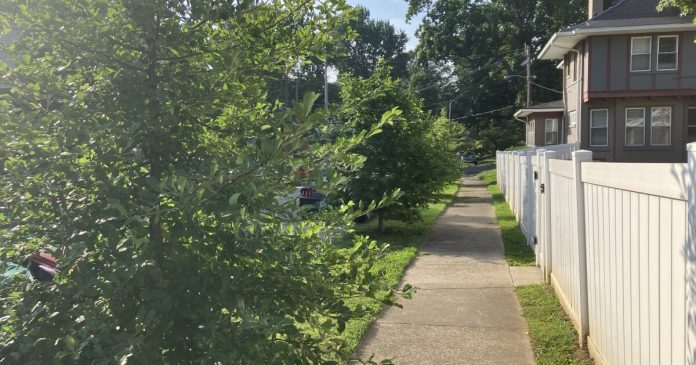The Urban Reforestation Grants Program is open through Aug. 11. It’s able to cover the cost of trees planted in most of Jefferson County through April 30, 2024. That doesn’t include the cities of Anchorage, Jeffersontown, Shively and St. Matthews, which run their own stormwater and drainage services.
MSD requires groups using the program to plant at least 10 noninvasive trees in containers at least 3 gallons large. It reimburses up to $120 for each 3-gallon container, and up to $240 for each 5-gallon or larger container. That can include related costs like buying mulch and water bags.
Trees serve purposes beyond providing attractive foliage to neighborhoods: They’re able to absorb rainwater that would otherwise flow into Louisville’s sewer system. When there’s heavy rain, the sewer pipes can overflow, causing waterways connected to the system to flood and erode.
The agency sees value in using some money it collects from ratepayers to help mitigate that. It aims to fund the planting of at least 1,000 trees each year.
Lori Rafferty is MSD’s floodplain manager and leads its municipal separate storm sewer system program. She said too much rain can also push sewage into waterways, including in the oldest parts of the city where stormwater and wastewater are collected together.
“On a normal day, all of the water goes to our treatment plant. But when there’s a lot of rain, it overflows. So the more that we can capture that water, the less there are overflows,” Rafferty said.
She also said rainwater can pick up pollutants on the ground that are beneficial to trees, including phosphorus, but harmful to waterways.
Along with other benefits, trees play a role in combating some of the threats posed by climate change. Higher temperatures increase air moisture, leading to a higher risk of flooding.
Warmer weather also exacerbates urban heat islands like Louisville, and trees can provide much-needed shade and cool the atmosphere.
Rafferty said MSD especially looks to approve grants in city areas with fewer trees.
“We have so much concrete, and roofs, and hard surfaces and things that create more heat and are able to retain more heat. And when you have more trees that can kind of reduce that impact,” she said.
The program began in 2011 and has about $240,000 allocated for it each year, according to Rafferty. She said it’s been especially popular in the Highlands area.
Alison Cromer is familiar with the grants. She’s the vice president of the Bonnycastle Homestead Association and chairs its reforestation committee.
Cromer estimated about 350 trees have been planted in the neighborhood through the program since 2016. She said that canopy has both an environmental effect and a financial impact.
“If you walk around a community that looks well-established, and like people have invested in not just their own homes but the streets as a whole, it impacts property values,” Cromer said.
Cromer said while the association hires a landscaper to dig holes, volunteers help with the tree-planting process. It hosts public sessions between late October and early November to add trees, right when they enter a dormant state.
“It, as a program, has been one of the most visible ways of generating community collaboration for a significant benefit that everybody can see,” Cromer said.
She said she hopes to see more city investment to plant trees.
A study by TreesLouisville last year found there was a 1% increase in local tree canopy from 2012 to 2019. That came after the nonprofit reported in 2015 that the city was losing 54,000 trees annually.
MSD asks groups who apply for the reforestation grants to submit reimbursement requests by May 15, 2024, but Rafferty said they can be compensated as soon as the trees are planted.
www.lpm.org
https://www.lpm.org/news/2023-07-30/louisville-msd-funds-community-tree-planting-to-reduce-threat-to-waterways














